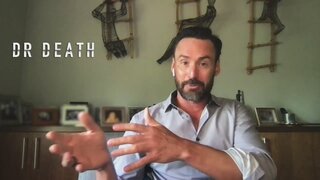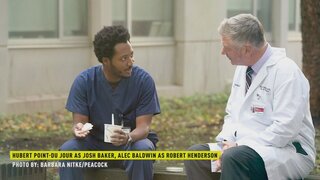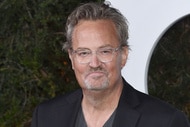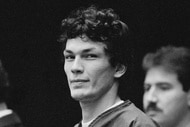What Was Dr. Christopher Duntsch's Background And Why Were People So Impressed With The Man Later Known As 'Dr. Death'?
“His resume looked brilliant on paper," journalist Matt Goodman said of Christopher Duntsch's ability to continue to gain employment at Texas hospitals despite a deadly track record.
Dr. Christopher Duntsch had the hallmarks of an impressive neurosurgeon, at least in theory.
His resume included a combined MD/PhD program and neurosurgical residency at The University of Tennessee at Memphis College of Medicine and was bolstered by a prestigious spine surgery fellowship in the city, a research patent under his name and published academic papers.
“His resume looked brilliant on paper,” journalist Matt Goodman, who wrote a profile of Duntsch for D Magazine in 2016, said in an episode of Oxygen’s “License to Kill.”
But in the operating room it was a different story entirely. He botched numerous surgeries between 2011 and 2013, leaving dozens of his patients either in chronic pain, paralyzed, or in some cases dead.
The story of his dramatic fall from grace, which resulted in the revocation of his medical license and a conviction for maiming a patient, is the focus of the new Peacock limited series “Dr. Death,” starring Joshua Jackson, Christian Slater and Alec Baldwin. (And if you want to dive even deeper into the story, you can also watch the new docuseries "Dr. Death: The Undoctored Story" on Peacock, which features interviews with numerous people intimately involved in the case.)
Duntsch was recruited to join a private practice in Dallas that specialized in minimally invasive spinal surgery, according to Goodman’s D Magazine piece. It was a lucrative position, paying $600,000 a year, and Duntsch was soon granted surgical privileges as a spine surgeon at Baylor Medical Center in Plano, now known as Baylor Scott and White Medical Center. But it wouldn’t be long before colleagues and his patients would question his ostensibly impeccable credentials.
Prosecutors would later tell CNBC’s “American Greed” that Duntsch injured 33 out of his 38 patients in less than two years, earning him the nickname “Dr. Death” and later allowing him to make history of another kind—becoming the first doctor ever convicted of aggravated assault for care provided in the operating room.
“This defendant singlehandedly ruined their lives, and he gave each of them a life of pain,” prosecutor Michelle Shughart said of his multiple victims during her closing arguments at trial, according to Esquire.
Before Duntsch would earn his deadly nickname, he had a seemingly average upbringing.
Duntsch was born in Montana before moving to Memphis with his family when he was in junior high, according to the “Dr. Death” podcast hosted by Laura Biel.
Duntsch and his siblings attended an evangelical Christian school and were raised by a stay-at-home mother and their physical therapist father.
Duntsch’s early passion was football. He earned a scholarship to play from Millsaps College in Mississippi and later earned a spot as a walk-on player at Colorado State, ProPublica reports.
Duntsch seemed determined to make it as football player—relentlessly working out and trying to master the plays—despite a lack of elite talent. Fellow teammate Chris Dozois told the news outlet that Duntsch struggled with mastering many of the plays but would beg to repeat them again and again.
“He’d be, ‘Coach, I promise I can get this, let me do it again.’ He’d go through; he’d screw it up again,” he said. “I gathered very quickly that everything that he had accomplished in sports had come with the sweat equity. When people said, ‘You weren’t going to be good enough,’ he outworked that and he made it happen.”
Dozois said in the podcast that he and Duntsch formed a “kinship” after they realized they both believed in the Rocky Balboa philosophy of how to prepare, referencing the fictional title character from the famed boxing movie franchise “Rocky.”
“It was actually inspirational for me, because in my mind, I thought I was the hardest working guy on the team and to discover that there was a whole other level was actually inspiring,” Dozois said.
But Duntsch’s college football career would be short-lived. He left Colorado after a year to return home to Tennessee, where he transferred to Memphis State.
With his football dreams squashed, Duntsch set his sights on a new mission: becoming a neurosurgeon.
He spent the following years earning his medical degree from The University of Tennessee at Memphis College of Medicine, where he was earned a slot in the prestigious Alpha Omega Alpha Medical Honor Society, an honor reserved for the top 12% of students, according to the 2016 profile in D Magazine.
During his surgical residency at the University of Tennessee, Duntsch took an interest in research after being named as the program director for the school’s tissue bank, where he oversaw two labs.
While there, Duntsch served as the principal or co-principal investigator on research studies, supplied tissue samples to scientists and became intrigued with a new business idea. He teamed with two scientists in the lab to start the company Discgenics, which pursued the possibility of using stem cells to produce intervertebral discs for people with back pain.
Duntsch focused on raising money for the fledgling company, securing investments from prominent neurosurgeon Dr. Jon Robertson, who had appointed him as the program director of the tissue bank, while his partners said they deserve credit for the science
“It wasn’t his invention,” Duntsch’s partner and scientist Valery Kukekov told D Magazine. “It was the invention of me and my wife, because we made all the primary experiments. We discovered it.”
From the outside, Duntsch appeared to be setting himself up for successful research career, but cracks were already starting to emerge in his carefully crafted persona.
There were reports that Duntsch had begun taking drugs. In a deposition taken for a lawsuit filed by Lee Passmore, one of many former Duntsch patients injured during a surgery, a woman named Megan Kane allege that Duntsch spent his birthday in either 2006 or 2007 snorting cocaine and taking LSD late into the night before donning his lab coat and making his rounds the next morning, according to D Magazine.
“I thought it was pretty amazing that he was even able to go to work the next day,” Kane said in a deposition. “Like, he wasn’t scared. He didn’t not want to. He wasn’t paranoid. After you’ve spent a night using cocaine, most people become paranoid and want to stay in the house. They don’t want to go participate in any extraneous activities, and he was totally fine going to work.”
Duntsch denied the claim, according to D Magazine.
Duntsch had also been sent to an impaired physician program for refusing to take a drug test after an anonymous woman called the university to report she had seen him using drugs, according to D Magazine. He was never removed from the residency and finished his final year after returning from the program.
After the former chief operating officer of Discgenics sued Duntsch for allegedly failing to live up to his promise to pay him stocks and a portion of his Duntsch's own salary, his involvement with the research company also began to falter. He was removed as a board member and chief science officer in 2012, pivoting to clinical practice.
Recruiters were impressed by his top-tier education and research contributions—paving his path into neurosurgery in Dallas—but his skills in the operating room proved disastrously lacking.
Dr. Robert Henderson (portrayed in the series by Alec Baldwin) and Dr. Randall Kirby (Christian Slater) would later lead the charge to strip Duntsch of his medical license after both were tasked with trying to repair Duntsch’s botched surgeries.
Duntsch’s failures in the operating room, however, never appeared to hurt his confidence. Kirby told “License to Kill” that was on full display when he ran into Duntsch in the doctor’s lounge shortly after he started at Baylor.
“He explained to me that he was the best spine surgeon in Dallas. This was like a month into his coming to Dallas from training,” Kirby said. “He doesn’t have the gravitas or the body of work to be able to make that kind of statement. I thought he was crazy, but I had no idea that things were going to get as bad as they would.”
Prosecutors said Duntsch would go on to botch nearly all of his procedures, leaving two patients dead and others paralyzed or in agonizing pain, as he moved from one hospital to another in Texas before his medical license was ultimately suspended.
He’s now serving life behind bars after being convicted of injuring elderly patient Mary Efurd, who woke up screaming and in severe pain after going to the doctor for a procedure to fuse two vertebrae, D Magazine reports.
Duntsch severed her nerve root, left spinal fusion hardware lodged into her muscle and left her spine riddled with screw holes.
“I’ve never really encountered this level of incompetence,” Henderson said in “License to Kill” of Duntsch’s brief but deadly surgical career.
"Dr. Death" and the companion docuseries "Dr. Death: The Undoctored Story" are both available to stream on Peacock now.


































